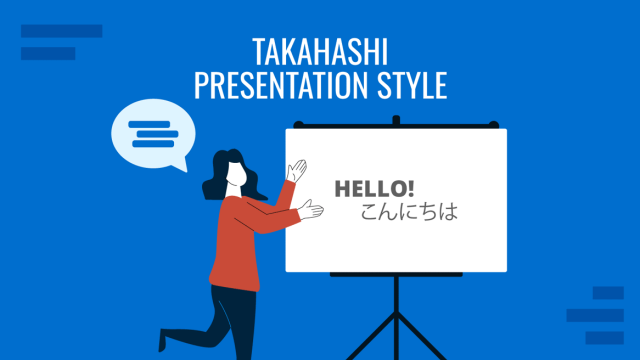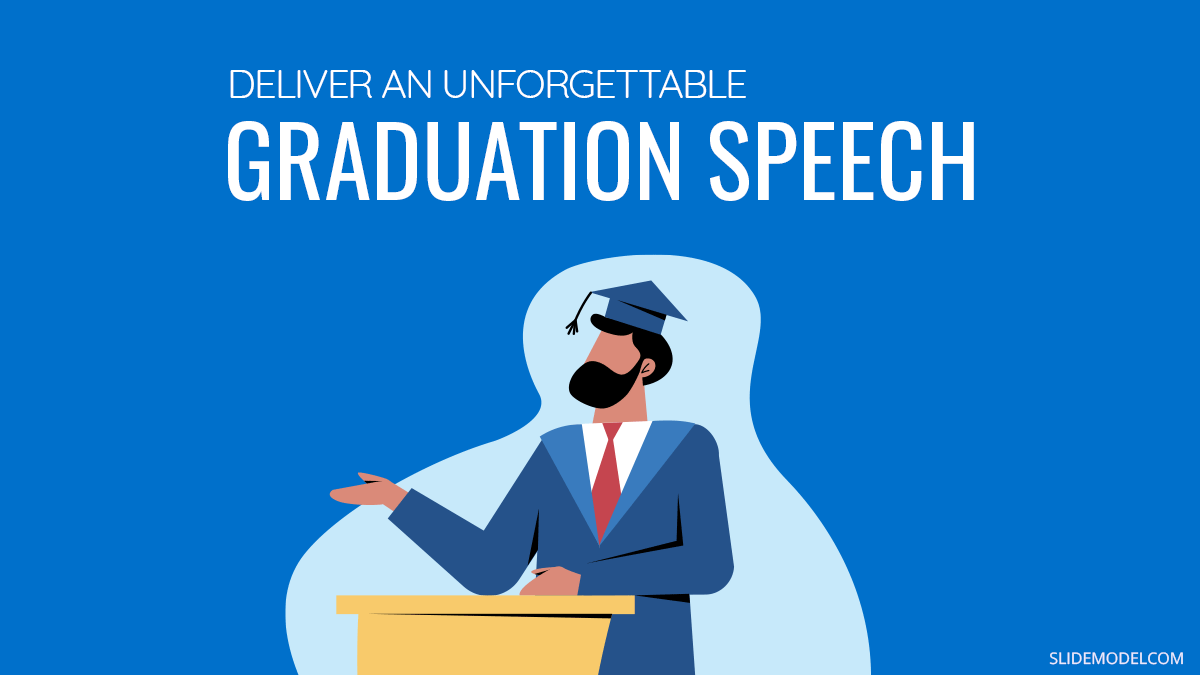
If you’re looking for advice on how to write a graduation speech, then there’s a good chance you’re either: getting ready for your moment to shine at graduation and want to make it as memorable as possible or are scared to death of public speaking and want any help you can get before graduation
Whether you’re a college student or almost a PhD, you’ll have to catch and keep the audience’s attention. You’re probably not going to be the only speech that day as well, which means you’ll want to stand out.
Whatever the motivation, here is everything you need to know about what makes a great graduation speech.
How to Write a Graduation Speech
Don’t be daunted by the importance of the graduation speech. It’s easier than you think! A lot of you have already written and presented a whole thesis defense, after all. You’ve got this!
Graduation speeches are usually somewhere between 5 and 15 minutes at most. With these tips and recommendations, you’ll build a memorable speech in no time. It´s important to remember that this is not a business presentation, so you can get creative and innovative with how you talk to the audience.
Also, check our article about thesis statement examples for more information.
Tips for Brainstorming your Graduation Speech
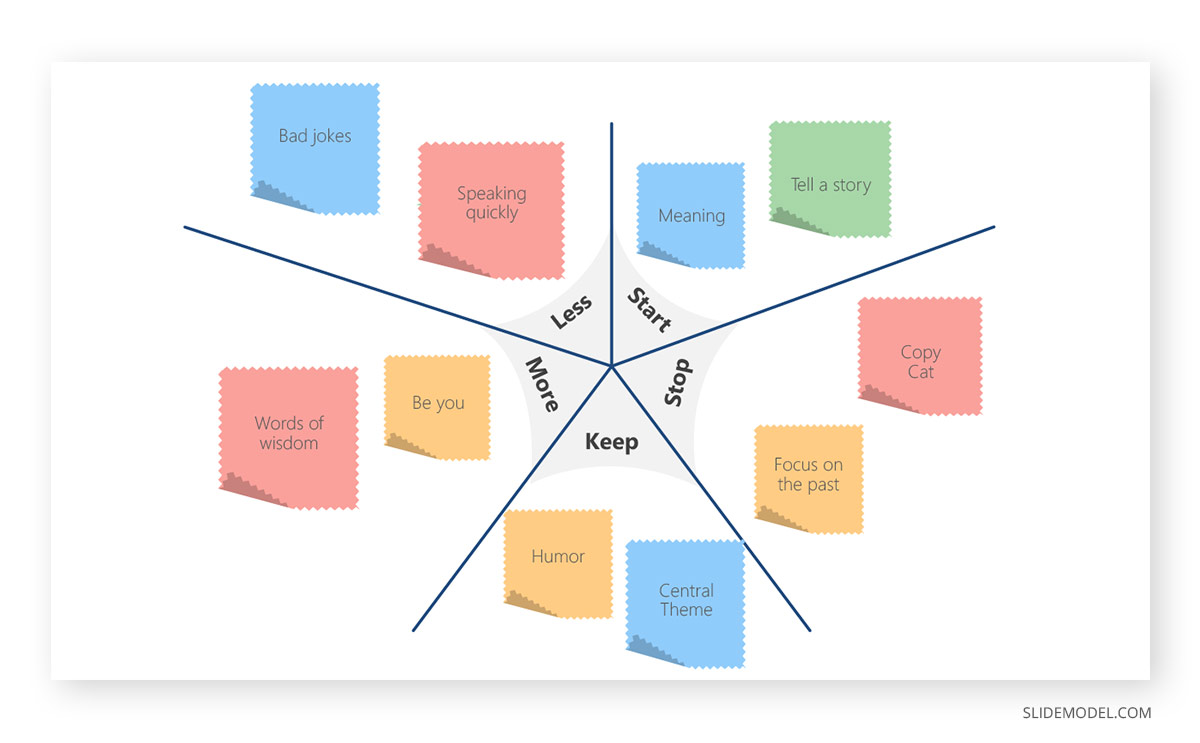
Talk to your peers about what graduation means to them.
Get their thoughts, feelings, and dreams about moving on to the next chapter of life. If you share pieces of what they’ve told you, it will make them feel heard and appreciated.
Don’t just talk about yourself.
Talk about your whole class, think about what motivates you all together, important shared memories or memories that might bond you.
Watch graduation speech examples online.
Notice what you like and don’t like. Do your research take notes and jot down the likes and dislikes you find in the speeches.
Pick a central theme.
This theme should be present throughout your speech, from the beginning to the end. Don’t start with one concept, but migrate to another concept at the end. Continuity will not only help you prepare your speech more easily, but it will help keep your audience engaged throughout the presentation.
Focus more on the future than the past.
Yes, you have all worked a lot to get where you are, which deserves to be celebrated. However, your graduation speech will be much more memorable and engaging if you inspire students on all the possibilities there are in the next step after graduation.
Avoid copying what everyone else does.
That’s a great way to get people to just tune you out completely. Be original. A great way to make this happen, is by creating a very particular PowerPoint Presentation that can be really eye-catching and creative.
Be yourself
Are you known for your witty, dry humor? Find ways to insert that into your speech. Even if you’re not the funniest person, you can still make your graduation speech unique. Knowledgeable? Give the audience a piece of interesting trivia they never knew before. A movie fan? Everyone loves a good movie reference. A speech that embodies who you are will always be more engaging than one that feels like someone else wrote it.

Ideas on How to Start a Graduation Speech
Start by thanking someone specific.
Instead of naming a long list of people you’d like to thank, choose one or two people and go into a little more depth on why you’re thanking them specifically. Tell an anecdote or short story about how they’ve helped, inspired, motivated, or supported you throughout your studies. Whether you make it heartwarming or humorous, people will start to feel invested in you, the same way that person was.
Start your graduation speech with a (tactful) joke
A little humor is an easy way to win your audience’s attention. Just make sure your joke is funny (and appropriate) by running it by several people before you put it in the final speech. Even if you start with a joke, it should still be related to the central theme of your graduation speech.
Tell a short story
An exciting story will immediately captivate your audience. It is a great way to connect with your peers, engage your audience, and segway into your main theme of the speech. The story should be appropriate, of course, and most importantly, short. A long, meandering story will lose listeners.
Share an interesting fact.
Of course, if you want to start your graduation speech with a fact, it will have to tie into your overall theme. And do make sure it is interesting. No one needs to know the current population size of polar bears, unless aspiring to be a generation that protects and improves the polar bear habitat is a major part of your theme.

Ideas on How to End your Graduation Speech
End with a quote
Some people think using famous quotes in speeches is a bit cliche, though we think a little differently. The correct quote at the right moment can be either powerful or funny, depending on what kind of graduation speech you’re going for.
Share your best words of wisdom.
Everyone has the wisdom to share. You may want to share the one, most important thing that you’ve learned. Or you might like to share a piece of knowledge that your grandpa always told you. Either way, if you think it will linger in the minds of your audience and help them out one day, then this can be an excellent way to end your speech.
Finish with a relevant memory
Nostalgia is a powerful motivator. Tap into this power by sharing the funniest, most empowering, or character-building memory you have of your time in school. Whether your audience laughs, cries, or claps, it will leave them with a good feeling.
Inspire with a call to action
Some of the best graduation speech examples you can find end with an inspiring call to action. What is a call to action? It’s a command that makes your audience want to get up and do what you just suggested. It motivates. It inspires action. Ending your graduation speech with a call to action is a dynamic and memorable way to close.

Advice on How to Present your Graduation Speech
Practice out loud
When preparing to present your graduation speech, you’ll want to practice out loud frequently. If you practice your speech following this formula, then you’ll be ready for the big day:
- Read through your speech out loud, fixing errors, as well as anything that sounds uncomfortable.
- Practice giving your speech in the mirror.
- Practice your speech in front of your family members multiple times.
- Say your speech to your close friends. After all, on graduation day, you’ll have to present it to them anyway. Sometimes things that seem like a good idea alone, or with your family, might change a little once you practice in front of your friends. The best speeches will work for you, your family, and your friends!
- Add pauses for laughter or emphasis.
If you’re planning on presenting a funny graduation speech, or at least funny parts, make sure you plan for short pauses for laughter. Even if your speech isn’t funny, there probably will be points where you want to pause briefly to let a vital message sink in. When you’re practicing the speech, you can go ahead and make these pauses, so they don’t surprise you when it’s time to present.
Don’t speak in monotone.
Avoid speaking in a monotone. Put inflection in your words. Since you’re most likely going to be presenting to a large audience, you may want to exaggerate that inflection a little.
Speak slowly
It is very common for first-time speech givers to speed up because they’re nervous. You can combat this by intentionally slowing down your speech. Make sure to practice it this way every time.
Make eye contact
As you give your graduation speech, look from one person to another in the eyes. Don’t linger too long on any one person, yet don’t just flit from one to another. You are talking to these people, which means you can make eye contact the way you would if you talked to them! This is a great way to keep people engaged with your speech, as well.
Graduation Speech Examples
Here’s a headstart on some research of graduation speech examples that will help you brainstorm your own speech.
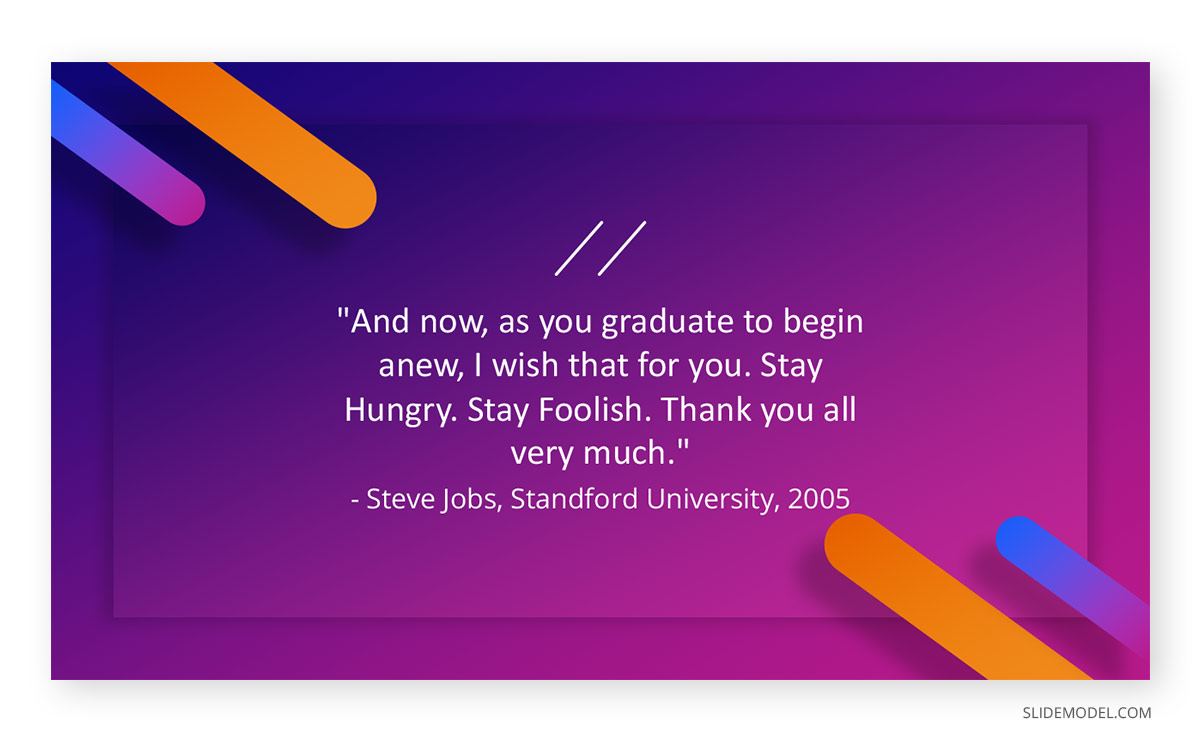
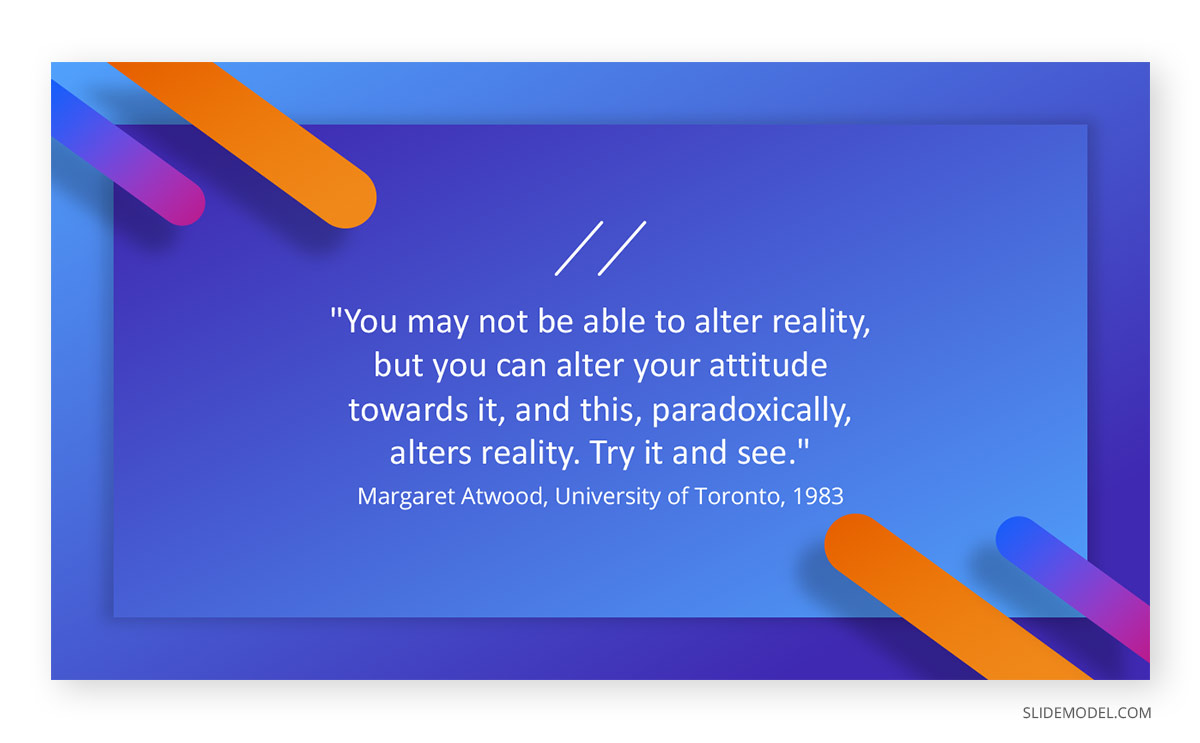
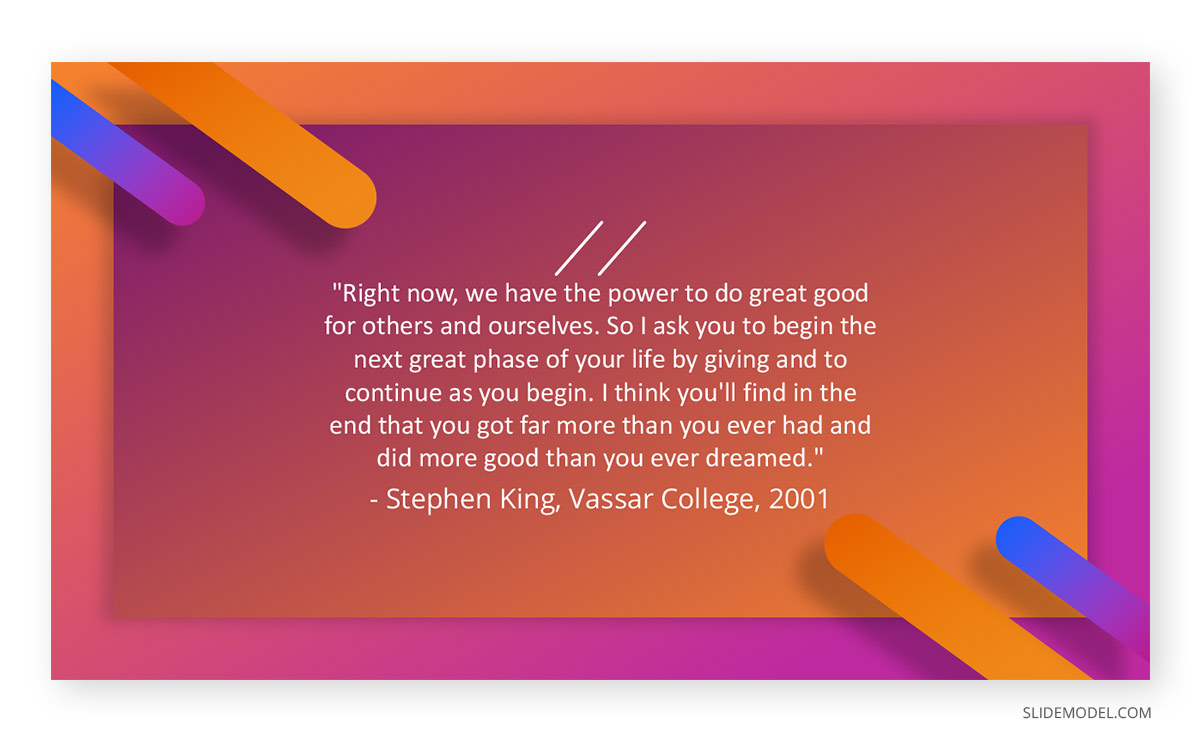
Some other interesting examples are:
In these famous speeches, you can see some important openers and closers that were used to deliver commencement and graduation speeches.
Angela Davis – Pitzer College – 2012
Opener:
“Good morning. What a beautiful day in Grinnell, Iowa! Congratulations, first of all, to the Class of 2007. I loved your glazed looks as you marched in. “Is this happening?”
Closer:
“We are the ones we have been waiting for.”
John F. Kennedy – Yale University – 1962
Opener:
“Let me begin by expressing my appreciation for the very deep honor that you have conferred upon me.”
Notable quote:
“For the great enemy of truth is very often not the lie — deliberate, contrived and dishonest — but the myth — persistent, persuasive, and unrealistic.”
Closer:
“We will generate a vision and an energy which will demonstrate anew to the world the superior vitality and the strength of the free society.”
Meryl Streep – Barnard College – 2010
Opener:
“Thank you, all. Thank you, President Spar, Ms. Golden, President Tilghman, Members of the Board of Trustees, distinguished faculty, proud swelling parents and family, and a gorgeous class of 2010.”
Closer:
“You know you don’t have to be famous. You just have to make your mother and father proud of you, and you already have. Bravo to you. Congratulations.”
How to Write a Graduation Speech (Final Advice)
Find your theme. Be yourself. Practice, practice, practice! Slow down. Breathe. You’ll do just fine. And congratulations on graduating!


